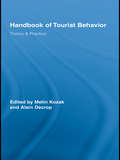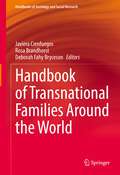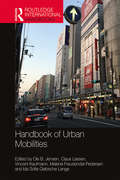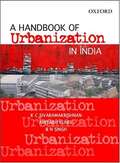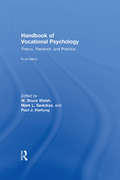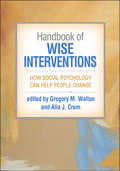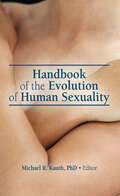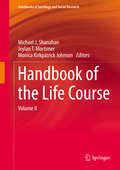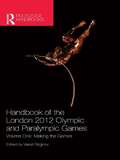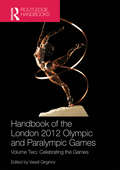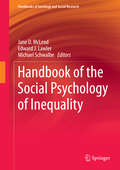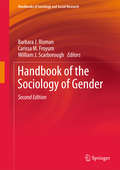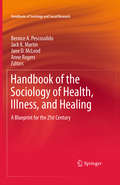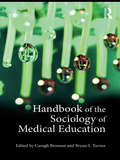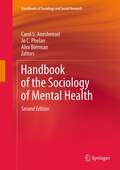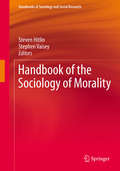- Table View
- List View
Handbook of Tourism and Quality-of-Life Research: Enhancing the Lives of Tourists and Residents of Host Communities
by Muzaffer Uysal M. Joseph Sirgy Richard PerdueQuality of life (QOL) research in tourism has gained much momentum over the last two decades. Academics working in this area research issues related to tourists and host communities. Practitioners are becoming increasingly interested in understanding the science that allows them to develop better marketing and managerial programs designed to enhance the quality of life of tourists. Tourism bureaus and government agencies are increasingly interested in issues of sustainable tourism, specifically in understanding and measuring the impact of tourism on the quality of life of the residents of the host communities. This handbook covers all relevant topics and is divided into two parts: research relating to travelers/tourists, and research relating to the residents of host communities. It is the only state-of-the-art reference book in its field and will prove invaluable to academics interested in QOL research, as well as tourism practitioners interested in applying the science of QOL in the tourism industry.
Handbook of Tourist Behavior: Theory & Practice (Routledge Advances in Tourism)
by Alain Decrop Metin KozakIn today’s highly competitive and global economy, understanding tourist behavior is imperative to success. Tourist behavior has become a cornerstone of any marketing strategy and action. Choosing, buying and consuming tourism/travel products and services includes a range of psycho-social processes and a number of personal and environmental influences that researchers and managers should take into account. This book provides an overview of such processes and influences and explains the basic concepts and theories that underlie tourist decision-making and behavior. It also incorporates a number of cases studies in order to aid readers to better appraise the application of those concepts and theories. The Handbook of Tourist Behavior will be of significant interest to researchers and students in tourism, leisure, marketing and psychology, and also to practitioners in the tourism industry.
Handbook of Transnational Families Around the World (Handbooks of Sociology and Social Research)
by Deborah Fahy Bryceson Javiera Cienfuegos Rosa BrandhorstThis handbook compiles the most up-to-date research on transnational families. It employs a dialogue between classical approaches and cutting-edge directions in transnational family research to identify continuities and changes in terms of socioeconomic disparities and actors, and to analyze coexistence. Further, the volume adopts a twofold global and international comparative perspective. On the one hand, it focuses on different migratory flows around the world and describes their entangled logics; on the other, it is written by an international group of contributors, with a diverse range of professional backgrounds. Their contributions are based on sound empirical research, and explore geographical regions around the world. The handbook presents different thematic perspectives on transnational families, including an analytical focus on gender, global sociodemographic inequalities, power asymmetries, and border- and mobility regimes, as well as the organization of transnational care, transnational fatherhood, ageing, family reunions and return. It also includes a variety of methodological approaches to transnational family research, ranging from ethnography, biographical research, and life-course methods, to multi-sited approaches and quantitative surveys. Investigating an emergent debate, it sheds new light on migratory fluxes, their common and specific determinants, the types of actors involved, and ways to empirically and methodologically approach them. This is a must-read reference for social scientists interested in family research, migration, and gender studies. Chapter 7 is available open access under a Creative Commons Attribution 4.0 International License via link.springer.com.
Handbook of Urban Mobilities (Routledge International Handbooks)
by Ole B. JensenThis book offers the reader a comprehensive understanding and the multitude of methods utilized in the research of urban mobilities with cities and ‘the urban’ as its pivotal axis. It covers theories and concepts for scholars and researchers to understand, observe and analyse the world of urban mobilities. The Handbook of Urban Mobilities facilitates the understanding of urban mobilities within a historic conscience of societal transformation. It explores key concepts and theories within the ‘mobilities turn’ with a particular urban framework, as well as the methods and tools at play when empirical, urban mobilities research is undertaken. This book also explores the urban mobilities practices related to commutes; particular modes of moving; the exploration of everyday life and embodied practices as they manifest themselves within urban mobilities; and the themes of power, conflict, and social exclusion. A discussion of urban planning, public control, and governance is also undertaken in the book, wherein the themes of infrastructures, technologies and design are duly considered. With chapters written in an accessible style, this handbook carries timely contributions within the contemporary state of the art of urban mobilities research. It will thus be useful for academics and students of graduate programmes and post-graduate studies within disciplines such as urban geography, political science, sociology, anthropology, urban planning, traffic and transportation planning, and architecture and urban design.
Handbook of Urbanization in India: An Analysis of Trends and Processes (2nd edition)
by K. C. Sivaramakrishnan Amitabh Kundu B. N. SinghThis work is one of the most comprehensive analyses of the extent, as well as the socio-economic and spatial characteristics, of urbanization in Indian. It assesses the nature of the policies and programs required for urban governance.
Handbook of Virtual Environments: Design, Implementation, and Applications, Second Edition (Human Factors and Ergonomics)
by Kelly S. Hale Kay M. StanneyA Complete Toolbox of Theories and TechniquesThe second edition of a bestseller, Handbook of Virtual Environments: Design, Implementation, and Applications presents systematic and extensive coverage of the primary areas of research and development within VE technology. It brings together a comprehensive set of contributed articles that address the
Handbook of Vocational Psychology: Theory, Research, and Practice (Contemporary Topics In Vocational Psychology Ser.)
by W. Bruce Walsh Mark L. Savickas Paul J. HartungHandbook of Vocational Psychology identifies, reports, and evaluates significant developments in vocational psychology and career counseling, and in doing so provides both professional clinicians and students with an informed understanding of both the current state and continuing progress in the field. As in previous editions, the fourth edition links theory and research with the more applied aspects of this field: four sections cover, in order, the field's history, theory, research, and practical applications. Clinicians, students, and academics at all levels of experience will find that the Handbook of Vocational Psychology, 4th ed, paints an accurate picture of the realities of work and serves as a practical reference work for anyone interested in keeping up to date with the latest research and trends in vocational psychology.
Handbook of Wise Interventions: How Social Psychology Can Help People Change
by Gregory M. Walton and Alia J. CrumPrecise shifts in the ways people make sense of themselves, others, and social situations can help people flourish. This compelling handbook synthesizes the growing body of research on wise interventions--brief, nonclinical strategies that are "wise" to the impact of social-psychological processes on behavior. Leading authorities describe how maladaptive or pejorative interpretations can undermine people&’s functioning and how they can be altered to produce benefits in such areas as academic motivation and achievement, health, well-being, and personal relationships. Consistently formatted chapters review the development of each intervention, how it can be implemented, its evidence base, and implications for solving personal and societal problems.
Handbook of the Evolution of Human Sexuality
by Michael R. KauthExpand your knowledge-with theories and concepts that may challenge your assumptions about sexual attractionHuman sexuality can be better understood by knowing how sexual psychologies may have evolved throughout the ages. Handbook of the Evolution of Human Sexuality presents a detailed examination of human sexuality, the assumptions about concepts and terms pertaining to sexuality, and the latest theories on the evolution of human sexual attraction. Leading experts explore various aspects of evolutionary theory, with a focus on Evolutionary Psychology (EP). Discussions include mate preferences, mating behavior, mate signaling, pheromones, and same-sex attraction. This comprehensive source also presents three groundbreaking theories of the evolution of same-sex attraction.Handbook of the Evolution of Human Sexuality takes current assumptions about human sexuality, explains each in turn, and then offers fresh perspectives on conventional concepts of sexual orientation. This extensive resource provides ample evidence to argue that researchers should investigate sexual relationships based on a person&’s characteristics such as personal traits, complementary roles/status, sexual acts, or situational context rather than simply the sex of the partner. The book provides a discussion of evolutionary theory, evolution of human sexual culture, evolution of sexual pleasure, and detailed analysis of assumptions about sexual orientation. The text is carefully referenced.Some of the topics explored by Handbook of the Evolution of Human Sexuality include: links to non-human primate sexual behaviors and the emergence of human (sexual) nature EP research on consensual adult human sexual behaviors studies of evolved male and female mating strategies, mate preferences, and sexual psychologies a brief history of the theory of evolution ancient culture, archeology, and an overview of premodern human sexuality evolutionary history of sexual pleasure human mating strategies development of mate preferences sexual signals, such as distinctive physical features, material wealth, etc. theories of the evolution of same-sex sexual attraction and behavior Primatologist Paul Vasey&’s observations of female Japanese macaques and their female-female sexual encounters-with an examination of human male-male behavior evolutionary history of female-female affectional bonding with a new theory on the behavior evolutionary history of male-male sexual behavior-with intriguing thoughts on why it happened evolutionary history of pheromones as chemical messengers much more Handbook of the Evolution of Human Sexuality is an important, thought-provoking resource perfect for evolutionary psychologists, sexologists, educators, researchers, scholars, and graduate students.
Handbook of the Geographies of Religion (Springer International Handbooks of Human Geography)
by Lily Kong Orlando Woods Justin K. H. TseThis international and interdisciplinary handbook offers a comprehensive and an in-depth overview of contemporary research, theory, and practice in the geographies of religion in various parts of the world and with different populations. The book showcases the major theoretical interventions in the field and the debates about the existential constitution of sacred space and what this means for secularization. It outlines the most significant geographical themes related to these new developments, with their implications for how to think about landscapes, space, bodies, and worlds. The book also discusses the future of the field, especially in the realms of encounters and ethics, economies and markets, institutions and organisations, movements and migrations, and media and mediums. It also offers views from disciplines outside of geography, including from sociology, anthropology, religious studies, and media and communications, which demonstrates the contributions of geographers of religion to wider intellectual conversations and debates.
Handbook of the History of Social Psychology
by Arie W. Kruglanski Wolfgang StroebeFor the first time in the history of social psychology, we have a handbook on the history of social psychology. In it, leading luminaries in the field present their take on how research in their own domains has unfolded, on the scientists whose impact shaped the research agendas in the different areas of social psychology, and on events, institutions and publications that were pivotal in determining the field’s history. Social psychology’s numerous subfields now boast a rich historical heritage of their own, which demands special attention. The Handbook recounts the intriguing and often surprising lessons that the tale of social psychology’s remarkable ascendance has to offer. The historical diversity is the hallmark of the present handbook reflecting each of this field’s domains unique evolution. Collectively, the contributions put a conceptual mirror to our field and weave the intricate tapestry of people, dynamics and events whose workings combined to produce what the vibrant discipline of social psychology is today. They allow the contemporary student, scholar and instructor to explore the historical development of this important field, provide insight into its enduring aims and allow them to transcend the vicissitudes of the zeitgeist and fads of the moment. The Handbook of the History of Social Psychology provides an essential resource for any social psychologist’s collection.
Handbook of the Life Course
by Michael J. Shanahan Jeylan T. Mortimer Monica Kirkpatrick JohnsonBuilding on the success of the 2003 Handbook of the Life Course, this second volume identifies future directions for life course research and policy. The introductory essay and the chapters that make up the five sections of this book, show consensus on strategic "next steps" in life course studies. These next steps are explored in detail in each section: Section I, on life course theory, provides fresh perspectives on well-established topics, including cohorts, life stages, and legal and regulatory contexts. It challenges life course scholars to move beyond common individualistic paradigms. Section II highlights changes in major institutional and organizational contexts of the life course. It draws on conceptual advances and recent empirical findings to identify promising avenues for research that illuminate the interplay between structure and agency. It examines trends in family, school, and workplace, as well as contexts that deserve heightened attention, including the military, the criminal justice system, and natural and man-made disaster. The remaining three sections consider advances and suggest strategic opportunities in the study of health and development throughout the life course. They explore methodological innovations, including qualitative and three-generational longitudinal research designs, causal analysis, growth curves, and the study of place. Finally, they show ways to build bridges between life course research and public policy.
Handbook of the London 2012 Olympic and Paralympic Games: Volume One: Making the Games
by Vassil GirginovThe Handbook of the London 2012 Olympic and Paralympic Games is an authoritative and comprehensive account of the world’s greatest sporting and cultural event. It tells the complete story of the 2012 Games from inception, through the successful bidding process and the planning and preparation phase, to delivery, the post-Games period and legacy. Written by a world-class team of international Olympic scholars, the book offers analysis of the full social, cultural, political, historical, economic and sporting context of the Games. From the political, commercial and structural complexities of organising an event on such a scale, to the sporting action that holds the attention of the world, this book illuminates every aspect of the 2012 Games, helping us to better understand the vital role that sport and culture play in contemporary global society. The book is divided into two volumes. Volume One: Making the Games, examines the build-up to London 2012, covering key topics such as: the bidding process planning and decision making financing the Games developing the infrastructure engaging national and international governing bodies of sport engaging the UK public engaging a global public developing a legacy programme the Cultural Olympiad. Richly illustrated with the personal accounts of key stakeholders, from sports administrators and politicians to athletes and spectators, and including essential data and evocative visual material, this book is essential reading for anybody with a personal or professional interest in the Olympic and Paralympic Games, global culture or the development of sport.
Handbook of the London 2012 Olympic and Paralympic Games: Volume Two: Celebrating the Games
by Vassil GirginovThe Handbook of the London 2012 Olympic and Paralympic Games is the first authoritative and comprehensive account of the world’s greatest sporting and cultural event. It tells the complete story of the 2012 Games from inception, through the successful bidding process and the planning and preparation phase, to delivery, the post-Games period and legacy. Written by a world-class team of international Olympic scholars, the book offers critical analysis of the social, cultural, political, historical, economic and sporting context of the Games. From the political, commercial and structural complexities of organising an event on such a scale, to the sporting action that holds the attention of the world, this book illuminates the key aspects of the 2012 Games, helping us to better understand the vital role that sport and culture play in contemporary global society. The book is divided into two volumes: Volume Two - Celebrating the Games, examines the period of competition and immediately afterwards, covering key topics such as: London welcomes the world - hospitality and the look of the games Experiencing the games -spectators, tourists, volunteers, shoppers, viewers Media and communications Running the games Creating Olympic celebrities Protesting the games Commerce, retail and consumption Documenting London 2012 in films and books The legacy of the 2012 Games for London, the UK and the Olympic Movement Richly illustrated with the personal accounts of key stakeholders, from sports administrators and politicians to athletes and spectators, and including essential data and evocative visual material, this book is essential reading for anybody with a personal or professional interest in the Olympic and Paralympic Games, global culture or the development of sport.
Handbook of the New Sexuality Studies
by Steven Seidman Nancy Fischer Chet MeeksAs the field of sexuality studies has become a growth area in academia and classes on sexuality studies are incorporated into various disciplines, the expanding book market has been filled with specialist oriented texts which are often theoretically focused and contain too many summaries for an undergraduate audience. Addressing this imbalance, this key new volume presents the field of sexuality in an accessible and engaging way for undergraduates. Breaking new ground, both substantively and stylistically, this book offers students, academics and researchers an accessible, engaging introduction and overview of this emerging field. Its central premise is to explore the social character of sexuality, the role of social differences such as race or nationality in creating sexual variation, and the ways sex is entangled in relations of power and inequality. Through this novel approach, the field of sexuality is considered, for the first time, in multicultural, global, and comparative terms and from a truly social perspective. This important volume consists of over fifty short and original essays on the key topics and themes in sexuality studies, and interviews with twelve leading scholars in the field which convey some of the most innovative work being done. Each contribution clearly conveys the latest research with examples. Ideal for students of gender and sexuality studies, this topical and timely volume will be an invaluable resource to all those with an interest in sexuality studies.
Handbook of the Psychology of Religion and Spirituality, Second Edition
by Raymond F. Paloutzian Crystal L. ParkWidely regarded as the definitive reference, this volume comprehensively examines the psychological processes associated with religion and spirituality. Leading scholars from multiple psychological subdisciplines present developmental, cognitive, social psychological, cultural, and clinical perspectives on this core aspect of human experience. The forms and functions of religious practices and rituals, conversion experiences, and spiritual struggles are explored. Other key topics include religion as a meaning system, religious influences on prosocial and antisocial behavior, and connections to health, coping, and psychotherapy.New to This Edition*Two chapters on cross-cultural issues.*Chapters on spiritual goals, emotional values, and mindfulness.*Reflects significant theoretical and empirical developments in the field.*Many new authors and extensively revised chapters.*Robust index amplifies the volume's usefulness as a reference tool.
Handbook of the Social Psychology of Inequality
by Jane D. Mcleod Michael Schwalbe Edward J. LawlerThis volume provides the first comprehensive overview of social psychological research on inequality for a graduate student and professional audience. Drawing on all of the major theoretical traditions in sociological social psychology, its chapters demonstrate the relevance of social psychological processes to this central sociological concern. Each chapter in the volume has a distinct substantive focus, but the chapters will also share common emphases on: * The unique contributions of sociological social psychology * The historical roots of social psychological concepts and theories in classic sociological writings * The complementary and conflicting insights that derive from different social psychological traditions in sociology. This Handbook is of interest to graduate students preparing for careers in social psychology or in inequality, professional sociologists and university/college libraries.
Handbook of the Sociology of Death, Grief, and Bereavement: A Guide to Theory and Practice
by Neil Thompson Gerry R. CoxThe Handbook of the Sociology of Death, Grief, and Bereavement sets issues of death and dying in a broad and holistic social context. Its three parts explore classical sociology, developments in sociological thought, and the ways that sociological insights can be useful across a broad spectrum of grief-related topics and concerns. Guidance is given in each chapter to help spur readers to examine other topics in thanatology through a sociological lens. Scholars, students, and professionals will come away from the handbook with a nuanced understanding of the social context –cultural differences, power relations, the role of social processes and institutions, and various other sociological factors – that shape grief experiences.
Handbook of the Sociology of Education in the 21st Century (Handbooks Of Sociology And Social Research Ser.)
by Barbara SchneiderThis handbook unifies access and opportunity, two key concepts of sociology of education, throughout its 25 chapters. It explores today’s populations rarely noticed, such as undocumented students, first generation college students, and LGBTQs; and emphasizing the intersectionality of gender, race, ethnicity and social class. Sociologists often center their work on the sources and consequences of inequality. This handbook, while reviewing many of these explanations, takes a different approach, concentrating instead on what needs to be accomplished to reduce inequality. A special section is devoted to new methodological work for studying social systems, including network analyses and school and teacher effects. Additionally, the book explores the changing landscape of higher education institutions, their respective populations, and how labor market opportunities are enhanced or impeded by differing postsecondary education pathways. Written by leading sociologists and rising stars in the field, each of the chapters is embedded in theory, but contemporary and futuristic in its implications. This Handbook serves as a blueprint for identifying new work for sociologists of education and other scholars and policymakers trying to understand many of the problems of inequality in education and what is needed to address them.
Handbook of the Sociology of Emotions: Volume II
by Jonathan H. Turner Jan E. StetsHandbook of the Sociology of Emotions Volume II presents all new chapters in the ever developing area of the sociology of emotions. The volume is divided into two sections: Theoretical Perspectives and Social Arenas of Emotions. It reviews major sociological theories on emotions, which include evolutionary theory, identity theory, affect control theory, social exchange theory, ritual theory, and cultural theory among others. Social arenas where emotions are examined include, but are not limited to, the economy and the workplace, the family, mental health, crime, sports, technology, social movements and the field of science. All the chapters review the major theories and research in the area and each chapter ends with some discussion of directions for future research. The Sociology of Emotions is a fast growing and vital field in the broad discipline of Sociology. This volume II follows the Handbook of the Sociology of Emotions which was first published in 2006. In 2008, this first handbook received the "Outstanding Recent Contribution" in the Emotions Section of the American Sociological Association. With contributions from leading scholars from different areas in the discipline, such as neurosociology, culture, economics, mental health, gender, social movements, discussing state-of-art theory and research on emotions in sociology this volume will generate wider appeal to the sociological community.
Handbook of the Sociology of Gender (Handbooks of Sociology and Social Research)
by Barbara J. Risman Carissa M. Froyum William J. ScarboroughThis handbook provides a comprehensive view of the field of the sociology of gender. It presents the most important theories about gender and methods used to study gender, as well as extensive coverage of the latest research on gender in the most important areas of social life, including gendered bodies, sexuality, carework, paid labor, social movements, incarceration, migration, gendered violence, and others. Building from previous publications this handbook includes a vast array of chapters from leading researchers in the sociological study of gender. It synthesizes the diverse field of gender scholarship into a cohesive theoretical framework, gender structure theory, in order to position the specific contributions of each author/chapter as part of a complex and multidimensional gender structure. Through this organization of the handbook, readers do not only gain tremendous insight from each chapter, but they also attain a broader understanding of the way multiple gendered processes are interrelated and mutually constitutive. While the specific focus of the handbook is on gender, the chapters included in the volume also give significant attention to the interrelation of race, class, and other systems of stratification as they intersect and implicate gendered processes.
Handbook of the Sociology of Health, Illness, and Healing
by Bernice A. Pescosolido Anne Rogers Jack K. Martin Jane D. McleodThe Handbook of the Sociology of Health, Illness & Healing advances the understanding of medical sociology by identifying the most important contemporary challenges to the field and suggesting directions for future inquiry. The editors provide a blueprint for guiding research and teaching agendas for the first quarter of the 21st century. In a series of essays, this volume offers a systematic view of the critical questions that face our understanding of the role of social forces in health, illness and healing. It also provides an overall theoretical framework and asks medical sociologists to consider the implications of taking on new directions and approaches. Such issues may include the importance of multiple levels of influences, the utility of dynamic, life course approaches, the role of culture, the impact of social networks, the importance of fundamental causes approaches, and the influences of state structures and policy making.
Handbook of the Sociology of Medical Education
by Bryan S. Turner Caragh BrosnanThe Handbook of the Sociology of Medical Education provides a contemporary introduction to this classic area of sociology by examining the social origin and implications of the epistemological, organizational and demographic challenges facing medical education in the twenty-first century. Beginning with reflections on the historical and theoretical foundations of the sociology of medical education, the collection then focuses on current issues affecting medical students, the profession and the faculty, before exploring medical education in different national contexts. Leading sociologists analyze: the intersection of medical education and social structures such as gender, ethnicity and disability; the effect of changes in medical practice, such as the emergence of evidence-based medicine, on medical education; and the ongoing debates surrounding the form and content of medical curricula. By examining applied problems within a framework which draws from social theorists such as Pierre Bourdieu, this new collection suggests future directions for the sociological study of medical education and for medical education itself.
Handbook of the Sociology of Mental Health
by Carol S. Aneshensel Alex Bierman Jo C. PhelanThis second edition of the Handbook of the Sociology of Mental Health features theory-driven reviews of recent research with a comprehensive approach to the investigation of the ways in which society shapes the mental health of its members and the lives of those who have been diagnosed as having a mental illness The award-winning Handbook is distinctive in its focus on how the organization and functioning of society influences the occurrence of mental disorder and its consequences. A core issue that runs throughout the text concerns the differential distribution of mental illness across various social strata, defined by status characteristics such as gender, race/ethnicity, socioeconomic status, and age. The contributions to this volume shed light on the social, cultural, and economic factors that explain why some social groups have an elevated risk of disorder. They also address the social repercussions of mental disorder for individuals, including stigmatization within the larger society, and for their families and social networks. The second edition of this seminal volume includes substantial updates to previous chapters, as well as seven new chapters on: -The Individual's Experience of Mental Illness.--The Medicalization of Mental Illness.---Age, Aging, and Mental Health.- -Religion and Mental Health.- -Neighborhoods and Mental Health.- -Mental Health and the Law--and Public Beliefs about Mental Illness.
Handbook of the Sociology of Morality
by Stephen Vaisey Steven HitlinHuman beings necessarily understand their social worlds in moral terms, orienting their lives, relationships, and activities around socially-produced notions of right and wrong. Morality is sociologically understood as more than simply helping or harming others; it encompasses any way that individuals form understandings of what behaviors are better than others, what goals are most laudable, and what "proper" people believe, feel, and do. Morality involves the explicit and implicit sets of rules and shared understandings that keep human social groups intact. Morality includes both the "shoulds" and "should nots" of human activity, its proactive and inhibitive elements. At one time, sociologists were centrally concerned with morality, issues like social cohesion, values, the goals and norms that structure society, and the ways individuals get socialized to reproduce those concerns. In the last half-century, however, explicit interest in these topics has waned, and modern sociology has become uninterested in these matters and morality has become marginalized within the discipline. But a resurgence in the topic is happening in related disciplines - psychology, neurology, philosophy, and anthropology - and in the wider national discourse. Sociology has much to offer, but is not fully engaged in this conversation. Many scholars work on areas that would fall under the umbrella of a sociology of morality but do not self-identify in such a manner, nor orient their efforts toward conceptualizing what we know, and should know, along these dimensions. The Handbook of the Sociology of Morality fills a niche within sociology making explicit the shared concerns of scholars across the disciplines as they relate to an often-overlooked dimension of human social life. It is unique in social science as it would be the first systematic compilation of the wider social structural, cultural, cross-national, organizational, and interactional dimension of human moral (understood broadly) thought, feeling, and behavior.

